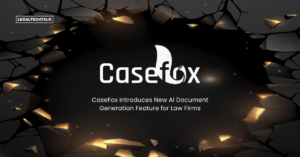In this enlightening interview with Tanja Podinic, Founder of Digital Legal Ventures, we delve into the barriers to innovation in law firms and in-house legal practices and explore the potential changes and opportunities on the horizon. Tanja sheds light on the challenges associated with adopting legal tech and the partnership model in law. She also discusses the transformational impact of generative AI and offers valuable advice on how in-house counsel can enhance their collaboration with law firms.
Bradley Collins: Hi Tanja, nice to catch up – from your perspective what have been the biggest barriers to innovation within both law firms and in-house practices in recent years and why?
Tanja Podinic: The biggest barrier is the quality and process of adopting legal tech within law, followed closely by the partnership model, which usually does not empower and incentivise lawyers to test legal tech.
Every minute spent selecting the right legal tech vendor; testing the tool, providing feedback, etc is a minute that is not spent on achieving billable targets.. It makes matters worse when legal tech vendors overpromise and under deliver, so if a lawyer was to invest the time and have a negative experience, they’re unlikely to go back.
The other piece is the lack of understanding as to how to charge clients when efficiency has been gained through technology use – what model do law firms adopt? Most of the time clients expect to see the full benefit of the efficiency gain, but law firms need to invest in the technology, train it and maintain it, a fair cost should be able to be passed onto clients. It would, in any event, lead to a win-win scenario.
Bradley Collins: Do you see anything changing in terms of legal innovation in the immediate future, if so, what, why, and how?
Tanja Podinic: Generative AI is a game changer! It will affect the way we practice law, the skills we need, the way we think about client service delivery. I mentioned the multiple barriers that law firms have when selecting and implementing tech, these are all barriers to a lawyer or client experiencing actual potential of the tool.
ChatGPT is easily accessible and available, if you know how to use a computer and have an email address you can experience the potential of generative AI. I think lawyers are creative and will find ways to utilise this powerful technology to reduce the mundane and operational tasks of their job. Lawyers will now push for the tech implementation.
“Lawyers are creative and will find ways to utilise this powerful technology to reduce the mundane and basic tasks of their job.“
Tanja Podinic, Founder of Digital Legal Ventures
However, we need to balance this with the risks it introduces to clients and legal service providers. This is where our advisory work with the Law Society of England and Wales is imperative – we work with the UK Government to address these issues, making sure we also champion the benefits, enabling lawyers and clients to take advantage of generative AI.
Bradley Collins: What advice can you offer in-house counsel looking to get more value from the law firms they are working with, and vice versa?
Tanja Podinic: Honest communication and increased collaboration – forming a team to help the client deliver on their goals and company’s strategy. Lawyers have a lot to offer clients, not just standard legal advice. However, they can only provide additional services or creative ways of problem solving if the client is willing to be transparent about what their organisation needs. I understand there are confidentiality issues at play, but I’d encourage in-house counsel to find a sensible compromise.
Feedback is also a big one – in my experience law firms don’t typically ask for feedback. I think in-house counsel should set up a feedback loop with their law firms, it doesn’t have to be formal, it’s just a ‘you did this well’, ‘we need you to improve in this area’ type thing, to give law firms some guidance on where they can improve.
Key Takeaways:
1. Embrace Legal Tech Mindfully: Legal professionals should carefully assess and select legal tech, focusing on its practical benefits rather than just appearing innovative. Seek honest feedback from peers and prioritize technology that enhances efficiency.
2. Prepare for Generative AI: Recognize the transformative potential of generative AI and explore its applications to streamline legal tasks. Stay updated on developments in AI technology and be proactive in pushing for its implementation.
3. Strengthen Collaboration and Feedback: Foster open and transparent communication between in-house counsel and law firms. Establish feedback loops to provide constructive input and guide law firms in improving their services. Collaborative teams aligned with client goals can enhance legal value delivery.








